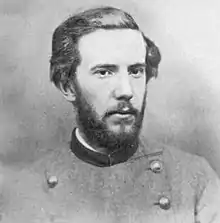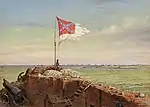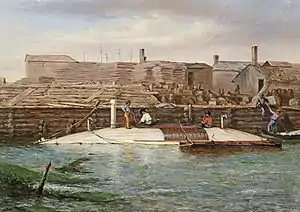Conrad Wise Chapman
Conrad Wise Chapman (February 14, 1842 – December 10, 1910) was an American painter who served in the Confederate States Army from 1861 to 1865.
Conrad Wise Chapman | |
|---|---|
 Chapman in uniform, ca. 1862 | |
| Born | February 14, 1842 Washington, D.C., U.S. |
| Died | December 10, 1910 (aged 68) Hampton, Virginia, U.S. |
| Nationality | American |
| Known for | Painting, drawing |
| Military career | |
| Allegiance | |
| Service/ | |
| Years of service | 1861–1865 |
| Rank | |
| Unit | |
| Battles/wars | American Civil War |
Early life
Conrad Wise Chapman was born in Washington, D.C. and grew up in Europe where his father, John Gadsby Chapman, was working as an artist.[1]
Career
In 1861, Chapman returned to America and enlisted in Company D, Third Kentucky Infantry, Confederate. He was wounded in Shiloh along with seeing action in Mississippi and Louisiana, before a transfer to the 46th Virginia Infantry at the request of his father to Henry Alexander Wise.[2] Over the next 10 months, he also served with the 59th Virginia Infantry, known as the Wise Legion or Wise Brigade, with both the 46th and 59th at Chaffin's Farm on the James River in Henrico County.[notes 1]
In September 1863, the Wise Brigade was ordered south to take part in the defence of Charleston, South Carolina.[3] Chapman was commissioned to create thirty one paintings of the city's defenses by Brig. Gen. Thomas Jordan, chief of staff to commanding Gen. P. G. T. Beauregard. This was part of a campaign by Beauregard to increase support for his ideas about the defense of the harbor in the Confederate government.[4] Chapman served in the city from early September 1863 to March 1864.[2] He intended to paint the entire series in Charleston, but having received word of his mother's illness, Chapman was granted furlough in April 1864 and left for Rome, Italy to visit his family. It is there that he painted 25 works—with five also done by his father—from sketches he made in Charleston.[1][5]
Chapman created art while he was on active duty during the war. While there were several artists on the Union side who captured the war in painting, who were also active, this was not the case on the Confederate side.[5] His works may be the only set of battle subjects painted by a Confederate artist during the war.[5]
After the end of the American Civil War, unable to reconcile to the Confederacy's loss, Chapman traveled to Mexico where he painted a series of views of the Valley of Mexico.[6] He also spent time in France and England. In 1898, his entire collection of paintings went on view at the Union League Club in New York, where they attracted attention, but no buyers.[7] He then moved his family to Richmond where the following year he sold 31 paintings to then Confederate Memorial Literary Society, which later became the Museum of the Confederacy and is now the American Civil War Museum.[6][7]
Gallery
 The 59th Virginian Infantry, Amon Carter Museum
The 59th Virginian Infantry, Amon Carter Museum Battery Laurens Street Charleston, Feb. 7, 1864, American Civil War Museum
Battery Laurens Street Charleston, Feb. 7, 1864, American Civil War Museum Battery Marshall, Sullivan's Island, Dec. 4, 1863, American Civil War Museum
Battery Marshall, Sullivan's Island, Dec. 4, 1863, American Civil War Museum Fort Sumter Gun Gallery, Dec. 8, 1863, American Civil War Museum
Fort Sumter Gun Gallery, Dec. 8, 1863, American Civil War Museum The Flag of Sumter, Oct. 20, 1863, American Civil War Museum
The Flag of Sumter, Oct. 20, 1863, American Civil War Museum Submarine Torpedo Boat H.L. Hunley, Dec. 6, 1863, American Civil War Museum
Submarine Torpedo Boat H.L. Hunley, Dec. 6, 1863, American Civil War Museum Torpedo Boat David at Charleston Dock, Oct. 25, 1863, American Civil War Museum
Torpedo Boat David at Charleston Dock, Oct. 25, 1863, American Civil War Museum Quaker Battery, 1864, American Civil War Museum
Quaker Battery, 1864, American Civil War Museum White Point Battery Charleston, Dec. 24, 1863, American Civil War Museum
White Point Battery Charleston, Dec. 24, 1863, American Civil War Museum View of Bishop's Palace near Monterrey, Private collection
View of Bishop's Palace near Monterrey, Private collection
References
- "Chapman Paintings Portfolio - About the Artists". The American Civil War Museum. Archived from the original on February 15, 2016. Retrieved February 9, 2016.
- Bassham, Ben L. (1998). Conrad Wise Chapman: Artist & Soldier of the Confederacy. Kent State University Press. pp. 88–89, 113. ISBN 0873385934.
- "Chapman, Conrad W." Soldier Details - The Civil War. National Park Service. Retrieved February 10, 2016.
- "Chapman Paintings Portfolio - The Man behind the mission". The American Civil War Museum. Archived from the original on February 15, 2016. Retrieved February 9, 2016.
- Harvey, Eleanor Jones (2012). The Civil War and American Art. Washington, DC: Smithsonian American Art Museum. pp. 130–146. ISBN 978-0-937311-98-1.
- "Father and Son: The Works of John Gadsby Chapman and Conrad Wise Chapman". Lva.virginia.gov. Retrieved April 22, 2014.
- Harvey, Eleanor Jones (December 4, 2013). "The South's Forgotten Painter". Opinionator. The New York Times. Retrieved February 9, 2016.
Footnotes
- Later in the war, it would be the site of the Battle of Chaffin's Farm.
Further reading
- Chapman, Conrad Wise, and Ben L. Bassham. Ten Months in the "Orphan Brigade": Conrad Wise Chapman's Civil War Memoir. Kent, Ohio: Kent State University Press, 1999. ISBN 0873386388 OCLC 40359330
- Chapman, Conrad Wise, Ben L. Bassham, and Ruben Charles Cordova. Conrad Wise Chapman: Mexican light, 1865-1910. Nueva York: Galería Ramis Barquet, 2005. OCLC 62190341
- Fischer, Hal, ed., Ben Bassham and Ruben C Cordova. Conrad Wise Chapman : The Valley of Mexico. San Diego: Putnam Foundation Inc., 1997. ISBN 1-879067-02-1
- Stevenson, Lauralee Trent. Confederate Soldier Artists: Painting the South's War. Shippensburg, PA: White Mane Pub, 1998. ISBN 157249073X OCLC 37903532